Stormont is braced for another week of drama
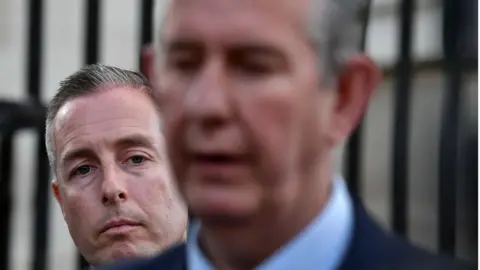 Charles McQuillan
Charles McQuillanIt's been a tumultuous number of weeks for the Democratic Unionist Party (DUP), and we now face into a potentially fraught number of days for Northern Ireland politics.
The coming week will likely bring the resignation of Arlene Foster and behind-the-scenes haggling by the DUP and Sinn Féin ahead of any appointment of new first and deputy first ministers.
BBC News NI looks back at what has happened, and what comes next.
How did we get here?
Let's have a quick recap. This all kicked-off at the end of April, when Arlene Foster announced she would be resigning as both DUP leader and first minister.
It followed an internal party revolt against her stewardship, with at least 22 MLAs and four MPs signing a letter-of-no confidence in the party's leadership.
Mrs Foster said she would step down as DUP leader on 28 May, and as first minister at the end of June.
What then followed was the party's first ever leadership contest in its 50-year history, with NI agriculture minister Edwin Poots going head-to-head with MP Sir Jeffrey Donaldson for the party's top post.
The contest was largely fought away from public view, with the contenders not allowed to give media interviews.
In the end, Mr Poots narrowly defeated his leadership rival, and was elected as DUP leader-designate on 14 May, with Paula Bradley named as the party's deputy.
Tensions were simmering behind the scenes, though, particularly about the manner in which Mrs Foster was ousted.
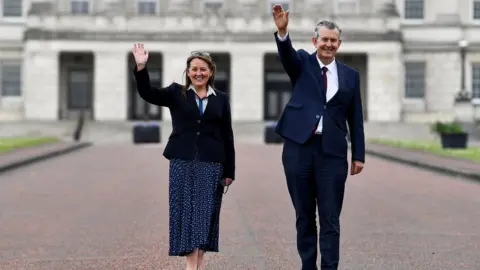 Reuters
ReutersIn the days after her resignation, she revealed she had not spoken to Mr Poots, and once even questioned the existence of the no-confidence letter as she said she had still not seen it three weeks after her departure announcement.
One former DUP MLA said the move to oust her was a "political assassination".
Tensions further flared during the meeting to ratify the new leadership, when a number of senior DUP figures walked out of the gathering before Mr Poots gave his speech.
After the ratification, Paul Bell, the former chairman of the DUP's Fermanagh and South Tyrone association, resigned from the party, arguing Mrs Foster was "stabbed in the back".
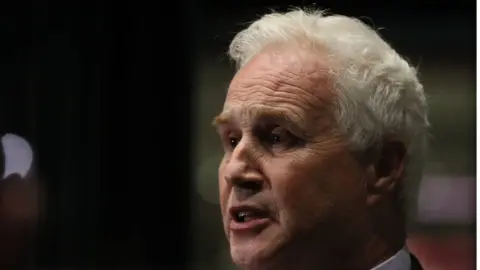 Brian Lawless
Brian LawlessMr Poots denied the party was divided as attention turned to his ministerial reshuffle, the way in which he might attempt to heal divisions, and who would be his nominee for first minister.
What about a new first minister?
Lagan Valley assembly member Paul Givan was nominated as first minister by the DUP leader on 8 June, but he doesn't just simply take office.
Mrs Foster must first resign as first minister. It's not clear when exactly she will do this, but it is expected that it could come on Monday having signalled she would be making a personal statement to the Northern Ireland Assembly.
When she does go, Sinn Féin deputy first minister Michelle O'Neill also loses her position as it is a joint office.
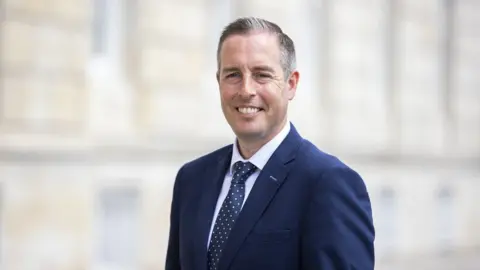 Liam McBurney
Liam McBurneyThen, there is a seven-day period allowed for the approval of a new first minister and deputy first minister by power-sharing partners Sinn Féin and the DUP.
Therefore, Mr Givan's appointment as first minister is contingent upon Sinn Féin support.
Mr Poots announced three new ministerial appointments on the same day that he unveiled Mr Givan as his first minister nominee - Michelle McIlveen replaces Peter Weir in education, Paul Frew replaces Diane Dodds in economy, and Gary Middleton takes on a junior ministerial role in the Executive Office.
Each of those will take effect from Monday. However, when the first and deputy first ministers go, so to does the executive.
Is this seven-day timetable just a technicality?
It isn't necessarily that straightforward.
It has been speculated that Sinn Féin may use this time to ensure the DUP gives firm commitments on areas yet to be delivered in the New Decade, New Approach deal, which restored power-sharing in January 2020, including a timetable for Irish language legislation.
Mr Poots, who was involved in negotiating the element of the deal that focuses on the Irish language, met Sinn Féin president Mary Lou McDonald in Belfast on Wednesday, in what is thought to have been further pre-negotiations before that formal seven-day deadline begins.
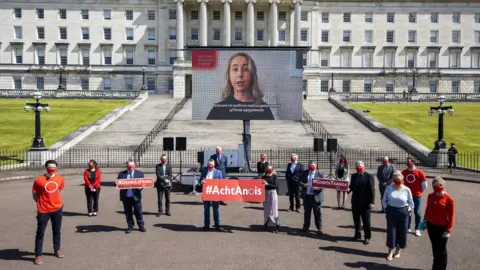 Liam McBurney
Liam McBurneySinn Féin's Michelle O'Neill said her party wants to hear "more than just fluffy words" about how the two parties can work together. She has said that Irish language legislation is a key component of the New Decade, New Approach deal, and delivery of it needed to be made before the end of the assembly mandate.
To add to the pressure, if Irish language legislation is to make it through the legislative process before the assembly mandate runs out in May 2022, it needs to get the green light before the summer recess on 10 July.
Could this all spark a political crisis?
That can never be ruled out.
If the DUP and Sinn Féin fail to nominate first and deputy first ministers, then the secretary of state is obliged to call an election within a reasonable time.
The New Decade, New Approach deal included a commitment to extend the time to appoint a new first or deputy first minister after a resignation from seven days to six weeks. That, though, has yet to be legislated for.
The key question is, do the parties want a crisis? Northern Ireland is recovering economically from the Covid-19 pandemic, but also faces further uncertainty posed by new variants, and it could be argued that political stability is key to that recovery.
It is also facing a significant health service waiting list problem - the worst in the United Kingdom - so the parties are unlikely to want to risk public ire by allowing the institutions to fall, especially as the three-year absence of power-sharing is still so fresh in voters' minds.
Has the DUP at least resolved its own internal divisions?
Given some of the reaction after Mr Poots announced his ministerial team, that seems unlikely.
Just prior to his ministerial announcements, DUP councillors Glyn Hanna and Kathryn Owen, along with others in the party's South Down association, quit, amid allegations of bullying and "a culture of fear" within the party.
Outgoing ministers Diane Dodds and Peter Weir were quick to welcome their successors via Twitter posts, but also said the reshuffle fell short of the healing that was needed.
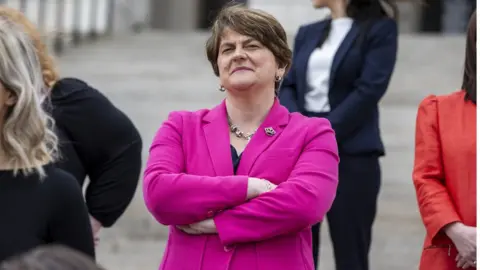 Liam McBurney
Liam McBurneyThey both later stood by their positions, with Mr Weir saying the party cannot keep on missing opportunities.
In one of her final engagements as first minister on Thursday, Mrs Foster voiced her sadness at the manner in which she was "taken out" of her position, adding she did not believe that the reshuffle showed signs of healing.
The new DUP leadership has stressed party divisions can be healed.
Deputy leader Ms Bradley said there is no purge being carried out, while Mr Poots said he wants anyone with allegations of bullying to bring them to him.
